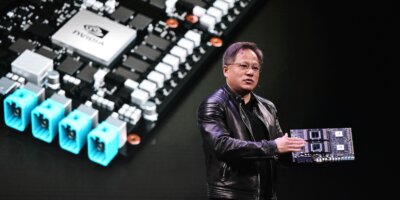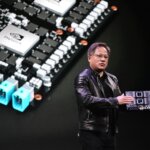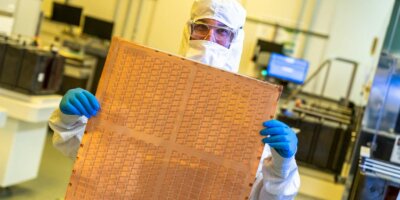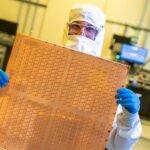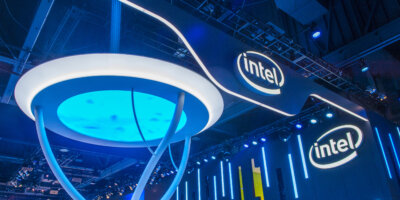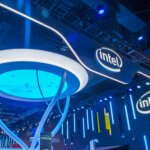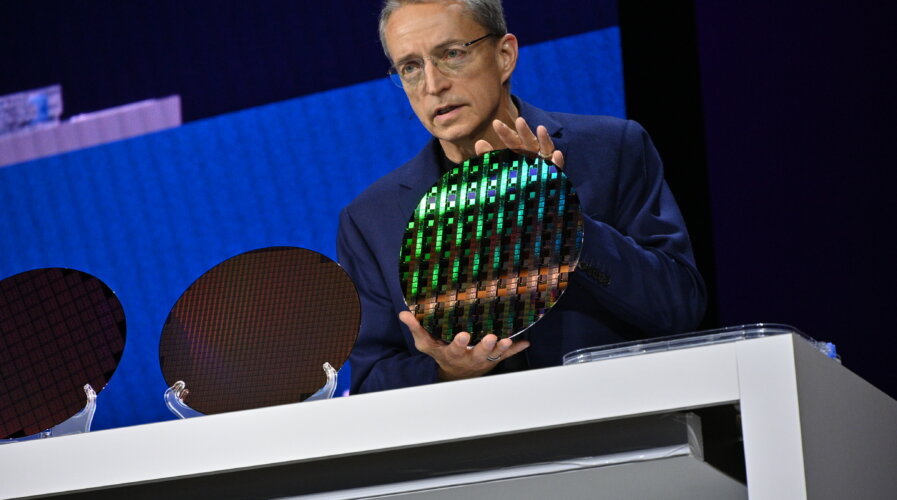
Intel CEO Pat Gelsinger holds up a wafer from Intel’s 18A production node, which he said remains on track to be manufacturing-ready in the second half of 2024. He displayed the wafer on Tuesday, Sept. 19, 2023, at intel Innovation in San Jose, California. (Credit: Intel Corporation)
Intel is ushering in a new age of the AI PC. Here’s what that means
- At Intel Innovation 2023, CEO Pat Gelsinger announced that the era of AI PC is upon us.
- Intel unveiled its first ever dedicated neural processing unit to accelerate AI workloads on PCs.
- Intel added that a large AI supercomputer will be built entirely on Intel Xeon processors and 4,000 Intel Gaudi2 AI hardware accelerators.
When Intel announced plans to restructure its graphics chips business in December 2022, it was obvious that the intention was to renew efforts to take on Nvidia and Advanced Micro Devices (AMD). Since then, the chip giant has been very bullish on artificial intelligence (AI) — informing investors that the company plans to “build AI into every product that we build.” Intel wasn’t overstating. This week, it pitched the idea of AI on the PC.
At its third annual Intel Innovation event, the tech giant unveiled an array of technologies to bring AI everywhere, “make it more accessible across all workloads, from client and edge to network and cloud,” as it explained in a statement. However, the most notable unveil has to be its new Meteor Lake, Intel’s first consumer chip with a built-in neural processor for machine learning tasks.
The chip, due in December, will be able to run ChatGPT-style technologies on a laptop rather than having to tap into cloud data centers for computing power. The capability, which Intel showed off during the software developer conference in Silicon Valley, is made possible by new AI data-crunching features built into the forthcoming Meteor Lake laptop chip and from new software tools the company is releasing.
At the conference, Intel demonstrated laptops that could generate a song in the style of Taylor Swift and answer questions in a conversational style, all while disconnected from the Internet. Intel’s CEO Pat Gelsinger even said Microsoft’s “Copilot” AI assistant will be able to run on Intel-based PCs.
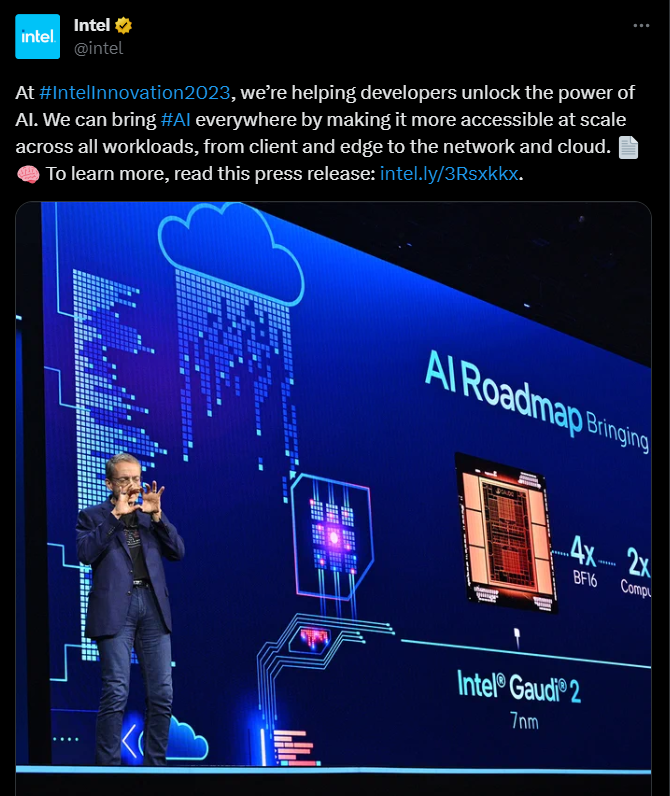
Gelsinger showed how Intel is bringing AI capabilities across its hardware products and making it accessible through open, multi-architecture software solutions. Source: Intel’s X
“We see the AI PC as a sea change moment in tech innovation,” Gelsinger said, adding that AI is about to get more personal, too. “AI will fundamentally transform, reshape and restructure the PC experience – unleashing personal productivity and creativity through the power of the cloud and PC working together,” he added.
The company is ushering in the age of the AI PC.
Here’s what we know about the AI PC
The new PC experience arrives with the upcoming Intel Core Ultra processors, code-named Meteor Lake, and it will also feature Intel’s first ever integrated neural processing unit (NPU) for power-efficient AI acceleration and local inference on the PC.
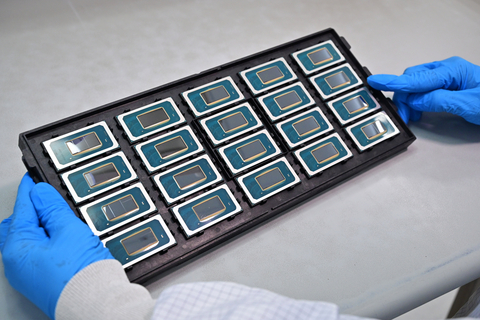
A photo shows a tray of Intel Core Ultra processors being assembled at Intel’s advanced packaging facilities in Penang, Malaysia. The Intel Core Ultra processor, code-named Meteor Lake, is the first client processor manufactured on the new Intel 4 process node using its 3D high-performance hybrid architecture, and the first client tile-based design enabled by Foveros packaging technology and features CPU, GPU and NPU. (Credit: Intel Corporation)
According to Intel executive vice president Michelle Johnston Holthaus, training large language models is still mostly done on cloud data centers, but an increasing amount of the decision-making workload done by AI – generating an answer to a query, for example – is being carried out by devices like a PC or smartphone.
“More than 50% of enterprise-managed data will be created and processed outside the data center or cloud by 2025,” she said. The company confirmed Core Ultra also will launch December 14. “We will ship tens of millions of AI-enabled PCs into the market throughout 2024,” Holthaus said. “It’s the inflection point that will drive power-efficient AI at scale. Intel is the only company in the world that can deliver that scale.”
Meteor Lake is also the first product made using the Intel 4 process node, and Intel 4, in turn, is the company’s first chip production tech to use cutting-edge extreme ultraviolet (EUV) lithography, said Intel vice president William Grimm, director of product engineering for logic tech and development.
For Intel, the adoption of EUV lithography is a critical step in the race to regain the lead in semiconductor manufacturing by 2025. The Meteor Lake chipset also comes with what Intel describes as “the most fundamental system-on-chip architecture design shift” in the past four decades. It was achieved mainly due to advanced chip packaging technology, the 3D Foveros packaging technology, Intel said.
That essentially means that instead of combining all the computing features onto a single chip, Intel separated them into “four disaggregated tiles” and then used its in-house 3D packaging technologies to connect them into one chip system. That means Intel can outsource the production of some of the individual chips and then package them in-house.
Intel has previously shared its aim to quadruple its 3D chip packaging capacity by 2023, with Malaysia eventually becoming its largest production base. Intel also said the company is on track to deliver Meteor Lake’s successor chip, “Arrow Lake,” next year.
The chip giant believes that when introduced later this decade, glass substrates – a breakthrough Intel announced this week– will allow for continued scaling of transistors on a package to help meet the need for data-intensive, high-performance workloads like AI, and will keep Moore’s Law going well beyond 2030.
An AI supercomputer
Gelsinger also teased what he claimed would be the “world’s largest AI supercomputer in Europe,” and one of the “top 15 AI supercomputers in the world.” Built in collaboration with Stability AI, the company behind the popular Stable Diffusion image generation model, the all-Intel system will reportedly leverage a combination of Xeon processors and 4,000 Gaudi2 AI accelerators.
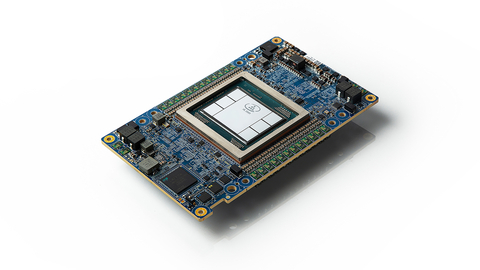
On Sept. 19, 2023, at Intel Innovation, Intel shared new details around Intel Gaudi2 accelerators and its customer. Recent MLPerf results spotlight the Gaudi2 accelerator as the only viable alternative on the market for artificial intelligence compute needs. (Credit: Intel Corporation)
Besides Dell, Alibaba Cloud’s chief technology officer, Zhou Jingren, explained how the Chinese tech giant applies 4th Gen Intel Xeon processors with built-in AI acceleration to their generative AI and large language model, Alibaba Cloud’s Tongyi Foundation Models. Intel’s technology, he said, results in “remarkable improvements in response times, averaging a 3x acceleration.”
READ MORE
- Data Strategies That Dictate Legacy Overhaul Methods for Established Banks
- Securing Data: A Guide to Navigating Australian Privacy Regulations
- Ethical Threads: Transforming Fashion with Trust and Transparency
- Top 5 Drivers Shaping IT Budgets This Financial Year
- Beyond Connectivity: How Wireless Site Surveys Enhance Tomorrow’s Business Network

